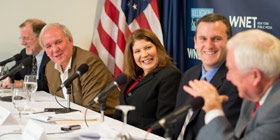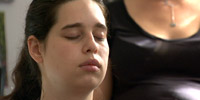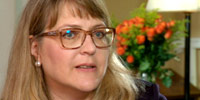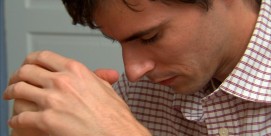None of the Above: The Rise of the Religiously Unaffiliated
NEW MINISERIES FROM RELIGION & ETHICS NEWSWEEKLY EXPLORES VIEWS OF 46 MILLION RELIGIOUSLY UNAFFILIATED AMERICANS
Program releases new survey of this rapidly growing population
WASHINGTON DC (October 9, 2012) — Religion & Ethics NewsWeekly, the national PBS television program produced by Thirteen/WNET, is launching a three-part mini-series, “None of the Above: The Rise of the Religiously Unaffiliated,” based largely on a new survey about the views of the 46 million Americans who say they are not affiliated with any particular religion. Watch a preview.
According to the Pew Research Center, one in five American adults — nearly 20 percent of the US population — now describe themselves as religiously unaffiliated, the highest percentage ever in Pew’s polling. Religion & Ethics NewsWeekly partnered with the Pew Research Center’s Forum on Religion & Public Life in a survey to delve more deeply into the theological, social and political views of these Americans, who are often called “the nones.”
“We’re getting a growing group, as much as one-fifth of the adult population, that do not identify with some kind of organized religion, and that has a lot of implications for religion, for politics, for society,” Prof. John Green, director of the Bliss Institute at the University of Akron, told Religion & Ethics NewsWeekly. “It represents a very significant change.”
Among the joint survey findings, the miniseries explores:
-
Two-thirds (68 percent) of those who describe themselves as religiously unaffiliated say they believe in God or a universal spirit. More than half (58 percent) say they often feel a deep connection with nature and the earth, and more than a third (37 percent) describe themselves as “spiritual” but not “religious.”
-
A third of adults under 30 have no religious affiliation, compared with just one-in-ten who are 65 and older.
-
The majority of the religiously unaffiliated are Democrats or lean Democratic, and 67 percent of them believe churches and other religious institutions are too involved with politics.
Large majorities of the unaffiliated say religious institutions are too concerned with money and power (70 percent) and focus too much on rules (67 percent). -
More than three-quarters (77 percent) say religious institutions play an important role in helping the poor and needy and bring people together and strengthen community bonds (78 percent).
-
While 76 percent of Americans overall believe that churches and other religious institutions protect and strengthen morality, only about half (52 percent) of the religiously unaffiliated agree.
-
The vast majority of religiously unaffiliated Americans are not actively seeking to find a church or other religious group to join. Of those who describe themselves as “nothing in particular” (as opposed to atheist or agnostic), 88 percent say they are not looking for a religion that is right for them.
The Pew Forum: “Nones” on the Rise
Download the full report (PDF, 1.37MB, 80 pages)
The survey was conducted among a nationally representative sample of adults in all 50 states, including 958 who are religiously unaffiliated.
The impact of the rise of the religiously unaffiliated on politics was further explored today at a panel at the National Press Club featuring Bob Abernethy, host and executive editor of Religion & Ethic NewsWeekly, Kim Lawton, managing editor of Religion & Ethics NewsWeekly, Greg Smith, senior researcher at the Pew Forum on Religion & Public Life, Mike McCurry, veteran communications strategist and spokesperson, and Michael Cromartie, vice president of the Ethics and Public Policy Center.
“None of the Above: The Rise of the Religiously Unaffiliated” will look at the impact of the rise of the religiously unaffiliated in three segments:
The first segment, None of the Above: Who Are They, will begin airing on public television stations nationwide on October 12, 2012. It provides an overview of who these religiously unaffiliated people are and what they believe. The story will be reported by R&E Host Bob Abernethy and produced by Marcia Henning.
The second segment, None of the Above: Political Implications, which begins airing on October 19, 2012, focuses on how the growing number of religiously unaffiliated citizens could affect elections and the role of religion in politics. The segment will be reported by R&E Managing Editor Kim Lawton and produced by Patti Jette Hanley.
The third segment None of the Above: Religious Implications, which begins airing October 26, 2012, looks at the possible influence of this trend on religious congregations and institutions. This segment will be reported by R&E Contributing Correspondent Deborah Potter and produced by Susan Goldstein.
Please check local listings for time and station information. Additional resource material, including video excerpts from the National Press Club panel, will be available here on this website.








